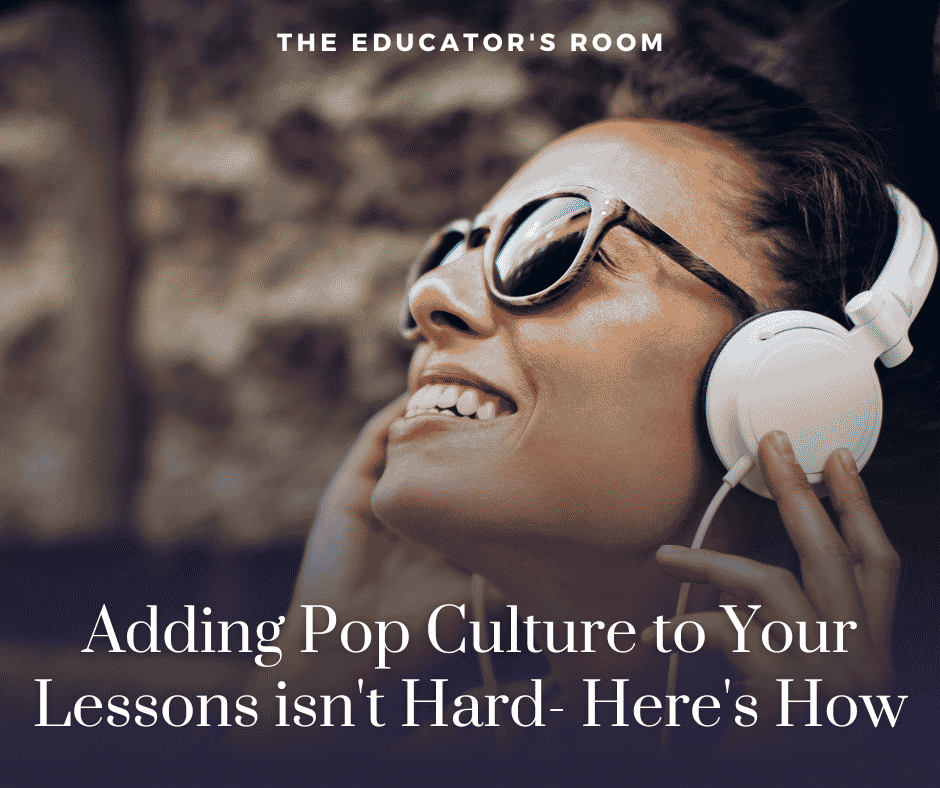Have you signed up for The Educator’s Room Daily Newsletter? Click here and support independent journalism!
Pop culture: Imagine entering a high school. The hallways are alive with discussions and debates, creative and well-thought-out student projects, and teachers as facilitators. I witnessed this with my own eyes several years ago. At a local high school, the first-year students completed projects on propaganda using pop culture. I was amazed at their high level of engagement, well-thought-out ideas, and confidence. It was something to see. Unfortunately, I have not seen that level of enthusiasm in a very long time. I often wonder why teachers are standoffish about using pop culture as a teaching and learning tool. Here are three reasons why using pop culture is worthwhile in your classroom.
Let’s define pop culture. People may have different ideas or perceptions of how they view pop culture, but here is one definition: “Pop culture refers to cultural products such as music, art, literature, fashion, dance, film, cyberculture, television, and radio that are consumed by the majority of a society’s population. Popular culture is those types of media that have mass accessibility and appeal.” Examples of popular culture include movies, popular magazines, Tiktok, Instagram, anime, comic books, popular reality television shows, popular radio shows, music videos, etc.
Pop Culture Can Increase Student Engagement
One reason to use pop culture as a teaching tool is that it gets students talking and having an interesting dialogue. Every day you hear students talk about the latest music, movies, TV shows, online articles, or current events. Why not use these as a way to lead into student discussions? As the teacher, you must keep up with the latest pop culture trends to connect with students. If you don’t make an effort, your students will make sure you know about viral dances (like Get Sturdy) and phrases anyway. It would be best if you also used current topics and trends to use with your students. Wouldn’t it be interesting to hear students debate the pros and cons of video games or popular music? You can turn to pop culture to introduce complex issues to your students. Your students will make you proud.
Pop Culture Can Make Learning Relevant
Second, pop culture can make topics or themes relevant to the students. How often have you heard the question, “Why do we need to know this?” You better believe that if one student is willing to ask it, the others think the same thing. Students want to know how they can relate to what you’re teaching.
Relatedness focuses on relationships and connections. Students connect to the songs, shows, and stories they hear from their friends, radio, social media, etc. They can connect ideas to how they live their lives, problem-solve, or how things affect them as human beings. Since the students are talking about these topics, let them compare songs and poems for similar themes or research songs that changed the world.
Pop Culture Creates Paths to Critical Thinking
Thirdly, the use of pop culture will allow for critical thinking. We want to create critical and independent thinkers. We aim for students to develop the skills to deeply examine a problem, form and ask questions, and seek a solution. Including pop culture in a lesson is an opportunity for students to connect dots between ideas that interest them and their academic content. Pop culture can serve as an entry point to higher-order thinking about other content. It may seem less formal and more fun to them than some of the general topics or themes they are used to. For example, perhaps students watch the 2020 version of the film, The Hate U Give and compare it to the social justice movement of the summer of the same year.
Students can explore their interpretation of media, personalities, and events that took place during that movement that rocked a nation. Imagine they analyze and deconstruct magazine or newspaper covers or analyze how different media outlets cover the same story. Then students can work collaboratively or independently to decipher how they can best use the information or skill.
Don’t Be Afraid to Use Pop Culture in Your Classroom
As educators, we want students to be curious, attentive, interested, and passionate about what they’re learning. Again, you hear students talking about what is happening, whether it’s a current event, a new song, athletes, actors, or the latest fashion. If you’re going to see all or some of those things, you have to give students something that excites them. Consider incorporating these items into reading, math, social science, and science.
Many educators do not like bringing pop culture into their classrooms. Some feel that it is inappropriate. Others deem it to be trivial and simplistic. However, do not underestimate the power of pop culture to open up new and different avenues of learning. It effectively gets students to think critically, speak up in class, collaborate, and work independently. Pop culture can help students to understand history and its progression. Pull from recent movies to illustrate historical events and concepts. Review and interpret TV shows or movies for specific themes or topics. Connecting academics to the real world is a major benefit of popular culture.
Add popular culture to your repertoire of teaching tools. Our students’ lives are impacted and influenced by pop culture. Their everyday interests in music, art, media, the internet, TV, radio, and fashion give educators an array of topics to increase the levels of engagement. Do not miss out on the value popular culture can bring to your classroom.
Editor’s Note: If you enjoyed this article, please become a Patreon supporter by clicking here.






